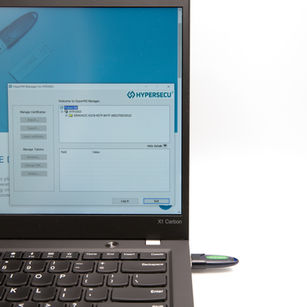
HYPERPKI
FIPS 140-2 Level 3 Certified
Our versatile HyperPKI Smart Card USB tokens are USB-interfaced device that offer a variety of security measures, including certificate-based public key infrastructure (PKI) authentication, digital signing, encrypting/decrypting files such as emails and documents, VPN client authentication and more.
SECURELY STORE AND USE DIGITAL CERTIFICATES
In digital certificate-based PKI applications, private keys play an important role in asymmetric cryptography. Our HyperPKI USB tokens ensure private keys are generated, stored, and used onboard within the security module inside the device, preventing any risk of leaking critical private key information. Our tokens are FIPS 140-2 validated and fully certified to ensure this level of protection meets the highest standards.
POWERED BY A SECURE CHIP
Secure smart card chips are widely adopted in the banking and payment card industries to ensure the highest level of protection. HyperPKI devices are equipped with a 32-bit smart card chip and a dedicated COS (Chip Operating System). Our HyperPKI HYP2003 USB tokens store digital certificates and private keys onboard for increased security. When decrypting, encrypting, or digitally signing, the token does so internally in a secure chip, meaning the keys are never at risk of being stolen.
DRIVERLESS & SIMPLE TO USE
The HyperPKI HYP2003 token requires no drivers with most popular OS platforms such as Windows, MacOS, and Linux. At the hardware level, it's natively recognized by the operating system, making it easy to use with no plugins necessary. High level applications can communicate with the token through the PKCS#11 library to perform standardized operations, such as key pair generation, encryption, decryption, digital signing, and more.
ADVANTAGES OF FIPS VALIDATION
The Federal Information Processing Standard (FIPS 140-2) specifies the security requirements that will be satisfied by a cryptographic module. It provides four increasing, qualitative levels intended to cover a wide range of potential applications and environments. The areas covered, related to the secure design and implementation of a cryptographic module include a number of important specifications, such as ports, interfaces, authentication, physical security, cryptographic key management, design assurance, attack mitigation, and more.
FIPS creates a uniform level of security for all federal agencies in order to protect what's categorized as sensitive but unclassified information: electronic data not classified as secret or higher, which makes up a large portion of the data around. All products that are validated under this standard have undergone rigorous testing and development.
Because of their highly assured level of security and because they meet such a broad spectrum of security requirements, FIPS 140-2 validated security products are widely accepted by government agencies, banks, and enterprises worldwide.


